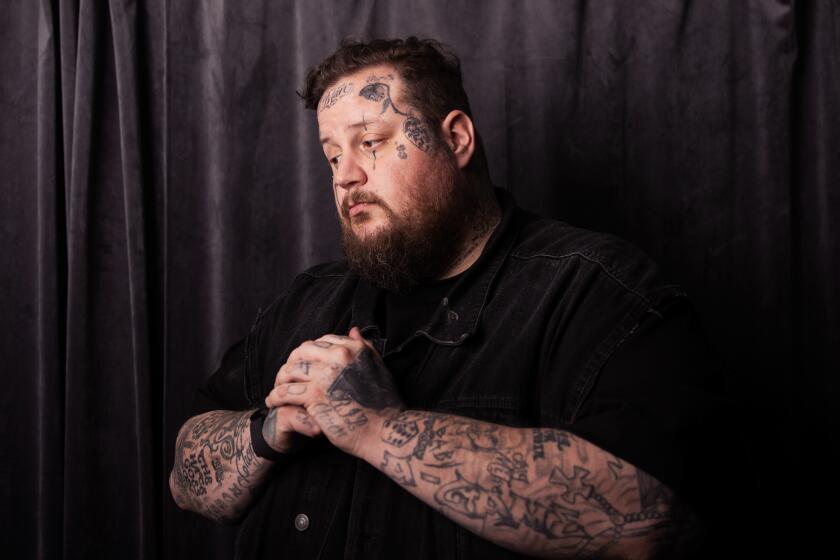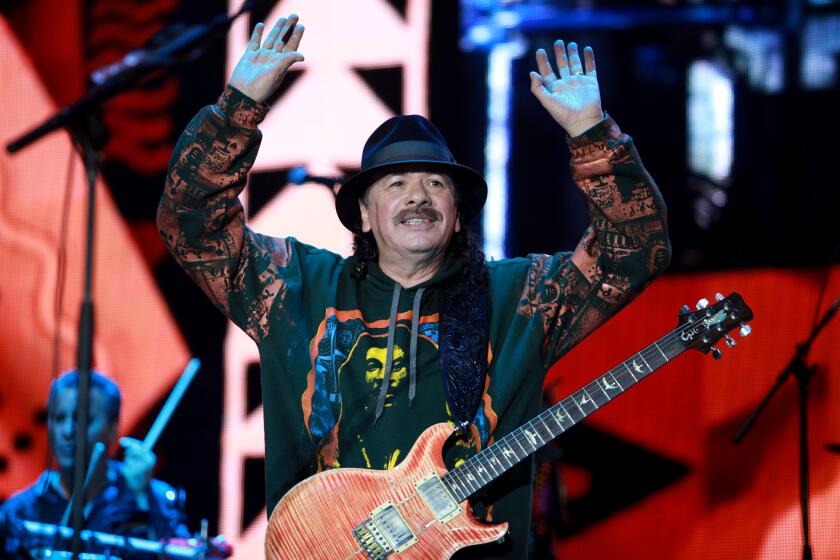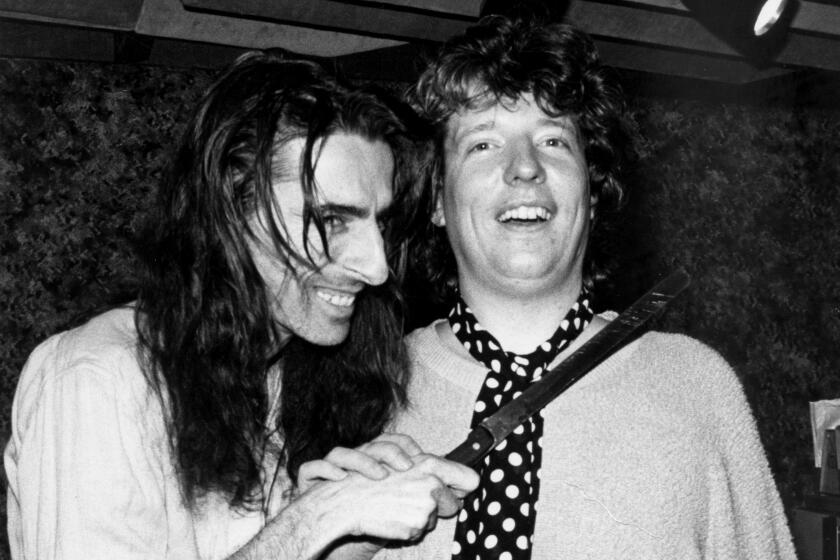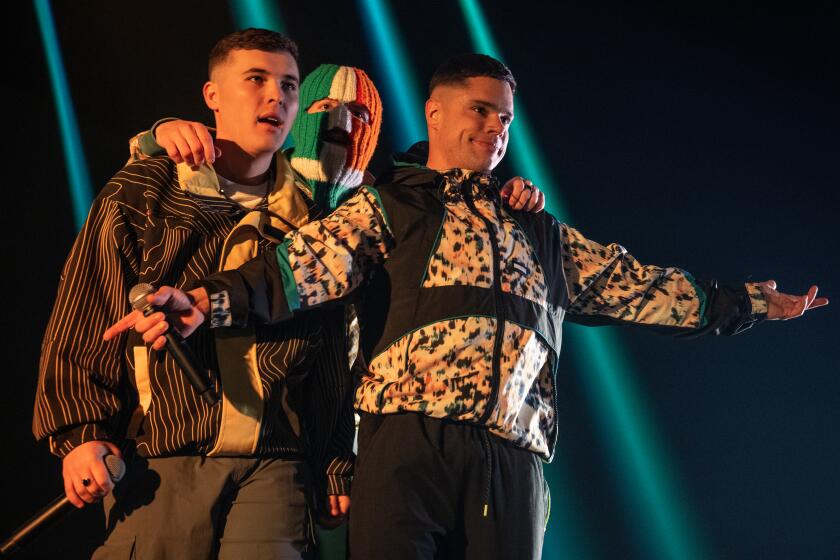As country music faces a racial reckoning, a new question: Where are the Latino artists?
- Share via
Growing up in El Paso, Texas, country singer-songwriter Valerie Ponzio watched her hometown change. As a child in the ’90s she frequently crossed the border with her family to Ciudad Juarez for shopping trips. By the early 2000s, violence increasingly overtook the Mexican city and debates intensified about border security. Most recently, El Paso has been marked by gun violence following the mass shooting that targeted Mexican residents in 2019.
It’s a turn of events that’s been emotional for Ponzio. “I just want to see people honor my hometown,” says the singer, a former contestant on “The Voice” who has written several songs highlighting El Paso. “It’s not what people think of it as.”
What hasn’t changed about El Paso over the past several decades is how it — and Latino culture more broadly — has been depicted in country music. To Ponzio, a song like Miranda Lambert’s recent “Tequila Does” is just another to stereotype her lived experience. The song, which opens with the line “His last name was Flores / he came up from Juarez / looking for a hell of a time,” depicts the region as a novelty where a border crossing ends up in another drunken night. It comes after signature country hits like Marty Robbins’ career-defining “El Paso” and Johnny Cash’s “Wanted Man” long portrayed the region as an area of vice.

Today, “Tequila Does” is part of a broader trend in recent years of popular country songs that have winked at Latino culture. Thematically this has most frequently included mentions of alcohol, such as Jon Pardi’s “Tequila Little Time” (which includes sonic references to mariachi music with the use of horns), and Luke Bryan’s “One Margarita.” These hits build on a longer history that presents Latino culture as a source of white escape in country music, whether through drinking, sexual escapades across the border or with Latinas more generally, or the Latin beach getaways described in countless Kenny Chesney songs.
What’s absent from country music’s long history of singing about Latino culture is striking: actual Latinos. Parallel themes of family, faith and rural culture found in Mexican regional and Tejano music make the exclusion of Latinos in country particularly confounding. Still, at a time when conversations about the lack of Black representation in country music have increasingly emerged over the past year, particularly surrounding the career of singer Mickey Guyton and her Grammy-nominated song “Black Like Me,” little has been said about the music’s similar neglect of Latino artists (singer Rissi Palmer’s “Color Me Country” podcast is an exception).

According to Jada Watson, adjunct professor at the University of Ottawa and lead investigator at SongData, just 0.5% of songs that charted on the Hot Country Songs between 1944 and 2016 were recorded by Latino artists. It’s a statistic that’s even worse for women, as nearly all of these singles were recorded by just three men: Johnny Rodriguez, Freddy Fender and Rick Trevino.
“Latinas are not just significantly underrepresented, they are strikingly absent,” explains Watson, whose research reveals that just a handful of Latina country artists — Rosie Flores, Star De Azlan and Leah Turner — have had charting hits.
Turner, Southern California-born and raised, is the highest-charting Latina in country music history (her 2013 hit “Take the Keys” peaked at No. 37 on Billboard’s country airplay chart). The daughter of a first-generation Mexican American mother and a rodeo champion father, she says that it’s past time for country music to open itself up to Latino artists rather than continue to allow white artists to appropriate the culture.
“It’s very offensive. We’re not a character, we’re not just a costume,” she says. “They are benefiting off of our culture and how cool it is and how different it is, and how everybody loves Mexico, and everyone loves a passionate Mexicana or señorita. They need to let us start sitting at the table that we built.”

Over the past decade, studies by the Country Music Assn. revealed that 7 out of 10 nonwhite Americans listen to country weekly, with Latino listeners showing particular interest in the genre. According to Karen Stump, senior director of consumer insights and research at the CMA, the organization is continuing to actively research the Latino country audience.
“CMA commissioned a multi-phase, multicultural research study which kicked off earlier this year to look at country’s shifting audience demographics,” she reports. “Our goal is to better understand these audiences, and their perspectives towards the genre.”
Studies like the CMA’s come as the broader entertainment industry is engaged in discussions about the overlooked buying power of Latinos in light of films like Lin-Manuel Miranda’s “In the Heights” and shows like the Selena miniseries on Netflix.
It’s a trend white artists like Lambert appear alert to. The singer recently recorded “Tequila Does” for a second time for her highly acclaimed “Marfa Tapes” and performed it earlier this month at the CMT Awards, just as the Miranda Lambert’s Casa Rosa bar, a self-described “Tex-Mex + Cantina,” has opened in downtown Nashville. The singer’s Idyllwind line for Boot Barn likewise draws from Mexican fashion styles.
The recent signing of the Puerto Rican and Cuban duo Kat & Alex to Sony Music Nashville, meanwhile, could suggest the industry is growing willing to support Latino artists. Kat Luna and Alex Garrido, who are married, first found national popularity as contestants on “American Idol” last year and have since built a social media following posting Spanglish renditions of well-known country songs.
“We believe Kat & Alex have the profound ability to transform and grow our genre,” says Jennifer Way, senior vice president of marketing at Sony Music Nashville. “Every time they post a Spanish cover of a country music song, they are bringing in new Spanish-speaking fans who may not have been able to identify with the genre previously.”

While some might find Nashville’s increased engagement with the Latino market surprising, there have been periods where a Latin breakthrough or two has spurred Music Row’s interest. Rodriguez and Fender, both Texans, scored multiple hits in the ‘70s and had long and successful careers. In the ‘90s, the industry briefly got behind Trevino (a Texan who only spoke English but whose label forced him to record his first album in Spanish), Emilio Navaira (who was called the “Garth Brooks of Tejano”) and roots band the Mavericks, led by Cuban American singer Raúl Malo. And in 2007, Texas native Star De Azlan became the first Latina signed to a major country record label (she was dropped by Curb Records after three singles).
But with just a handful of gatekeepers centralized in Nashville who have shown little interest in deviating from the white status quo, country music faces a steeper climb toward diversity than other genres. Those few exceptions aside, Nashville has largely closed itself off to Latino country artists.
Ponzio and Turner report experiencing both covert and overt discrimination because of their ethnicity.
“I noticed when I was on ‘The Voice,’ there was something very coded about a lot of the criticism. There was a lot of ‘you don’t belong in country,’” Ponzio says.
Turner, meanwhile, describes a former manager who gave her a stereotyped nickname based on her Mexican identity.
“I had a manager at one time who would always call me ‘Taco,’ ” she recalls. “I finally said stop calling me ‘Taco.’ You’re only calling me ‘Taco’ because I’m half Mexican.”
When it came to marketing herself in the early stages of her career, Turner was flat-out told by her record label to obscure her Mexican roots — an ability that wouldn’t be afforded to Latinos with darker skin. To Turner, this decision was strategic and protective, rather than a source of direct discrimination from the industry.
“When they said that, it wasn’t because they were being like, ‘We don’t want anybody to know that you’re Mexican,’” she says. “They were protecting me from what the fanbase would do.”
Turner’s label may have been shortsighted, to put it kindly, but they had a point. Guyton, a Black woman, has frequently been the target of verbal abuse online, and Ponzio and Turner have experienced backlash from fans for speaking about lack of Latino representation in country music. Such experiences speak to the white, often conservative fanbase the country music industry has long prioritized, and were exacerbated by the anti-immigrant rhetoric fomented by former President Trump and Fox News.
Despite negative interactions with fans, Turner also points to positive messages from Latino listeners who feel her music validates their place as fans of country music. It’s a community that’s helped encourage her upcoming EP, which will be independently released in July and draws heavily on both her Mexican and cowgirl roots. For her, it’s a combination that’s natural to country music.
“The Latino culture and country music culture 100% mirror one another. There’s faith, there’s family, there’s hard work, there’s passion, and we all know Latinos and country music [fans like] to drink,” she says. “My dream is for the cowboys and the vaqueros — who were the first cowboys — to all be in one place, to bring those two worlds together.”
Amanda Marie Martinez is a doctoral candidate in the history department at UCLA, and a fellow in the department of recording industry at Middle Tennessee State University, where she teaches the history of country music.
More to Read
The biggest entertainment stories
Get our big stories about Hollywood, film, television, music, arts, culture and more right in your inbox as soon as they publish.
You may occasionally receive promotional content from the Los Angeles Times.











